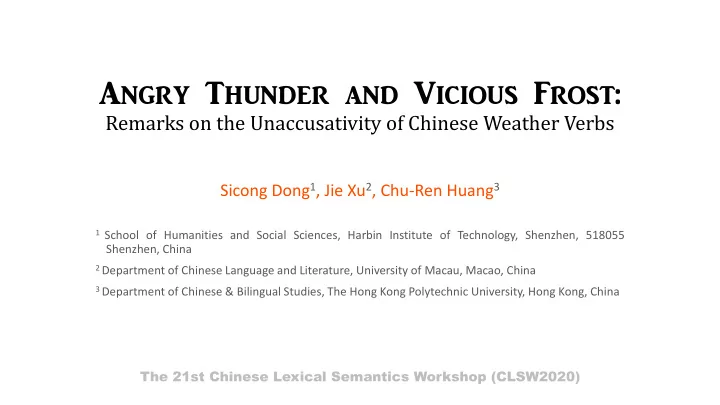

Angry Thunder and Vicious Frost: Remarks on the Unaccusativity of Chinese Weather Verbs Sicong Dong 1 , Jie Xu 2 , Chu-Ren Huang 3 1 School of Humanities and Social Sciences, Harbin Institute of Technology, Shenzhen, 518055 Shenzhen, China 2 Department of Chinese Language and Literature, University of Macau, Macao, China 3 Department of Chinese & Bilingual Studies, The Hong Kong Polytechnic University, Hong Kong, China The 21st Chinese Lexical Semantics Workshop (CLSW2020)
1. Unaccusativity • Unaccusative 非宾格动词 take internal arguments, i.e., subjects originate as objects non-volition The patient died. • Unergative 非作格动词 take external arguments The man is running. volition
1. Unaccusativity • Unaccusative 到 dào ‘arrive’, 死 sǐ ‘die’, 发生 fāshēng ‘happen’, 出现 chūxiàn ‘appear’ • Unergative 睡 shuì ‘sleep’, 笑 xiào ‘laugh’, 哭 kū ‘cry’, 跳 tiào ‘jump’ • One criterion: order of N and V in attributive clauses 死了一条狗的老头 / * 一条狗死了的老头 美国人旅游的季节 / * 旅游美国人的季节
2. Unaccusativity of Weather Verbs • Debate on the unaccusativity of weather verbs (1) unaccusative; (2) not unaccusative; (3) both; (4) neither • Chinese weather verbs 下雨了。 unaccusative 降雪了。 The only argument of a weather verb appears in the postverbal object position. • Sinitic languages/Chinese dialects
3. Chinese Weather Verbs • Mandarin 下雨 / 下雪 / 下雹子 / 下霜 / 起雾 了。 雨下 / 雪下 / 雹子下 / 霜下 / 雾起 了。 打雷 / 闪电 / 刮风 了。 * 雷打 /* 电闪 /* 风刮 了。 • 下 , 起 : surface and deep unaccusativity? • 打 , 闪 , 刮 : surface unaccusativity?
3. Chinese Weather Verbs • Sinitic languages Thunder : 打 dǎ ‘hit’, 拍 pāi ‘slap’ ; 响 xiǎng ‘make sound ’, 吼 hǒu ‘roar’, 叫 jiào ‘shout’, 哀 āi ‘whine’ Frost : 打 dǎ ‘hit’ ; 下 xià ‘fall’ , 落 luò ‘fall’ , 降 jiàng ‘fall’ , 上 shàng ‘rise’ Thunder strike : 雷打 léidǎ thunder-hit, 雷劈 léipī thunder-chop, 天打 tiāndǎ Tian- hit, 雷公劈 léigōngpī Lord_of_Thunder-chop, 龙抓 lóngzhuā dragon-claw, 佛拌 fóbàn Buddha-throw shuāngdǎ frost-hit, 霜 杀 shuāngshā frost-kill, 霜 冻 Frost damage : 霜 打 shuāngdòng frost-freeze volitionality + a second argument
4. Two Event Types • Activity • Happenstance It rained (a light rain) . A light rain rained on my head . unergative unaccusative 一直不下雨 雨下得很密 一直不下雨的时候 雨下得很密的时候 要下雨了 雨下得更大了 不管刮风下雨 雨下个不停
5. Conclusion • Weather verbs in Mandarin and other Sinitic languages are not uniformly unaccusative. unaccusative: 一直不下雨 ; 又开始打雷了 unergative: 雨下个不停 ; 雷打了半天 transitive: 滨河路上的一棵老柳树雷打掉了 (Lanzhou Chinese)
Recommend
More recommend